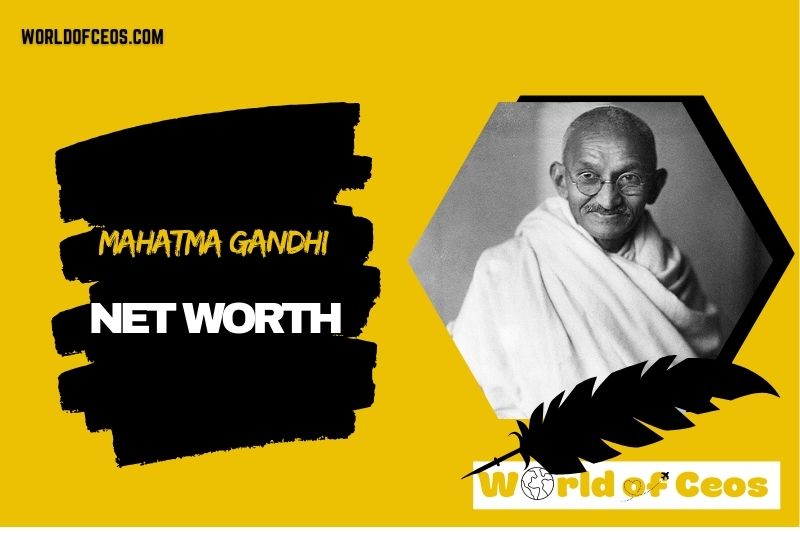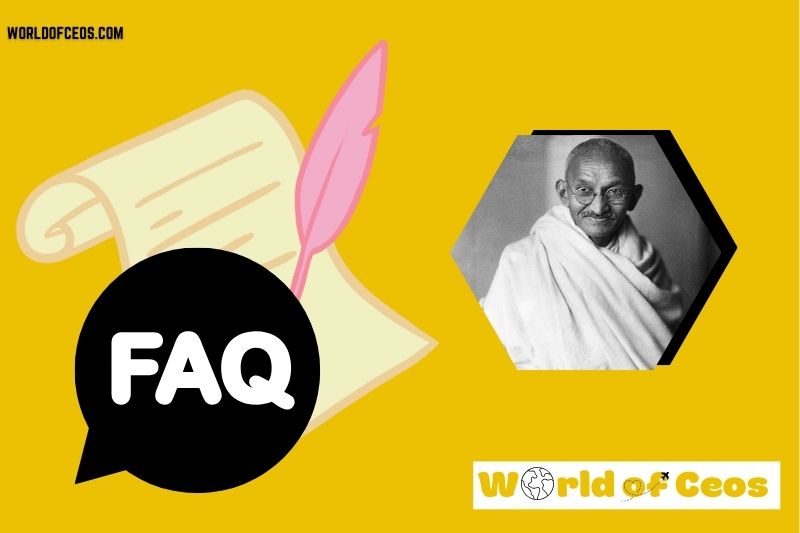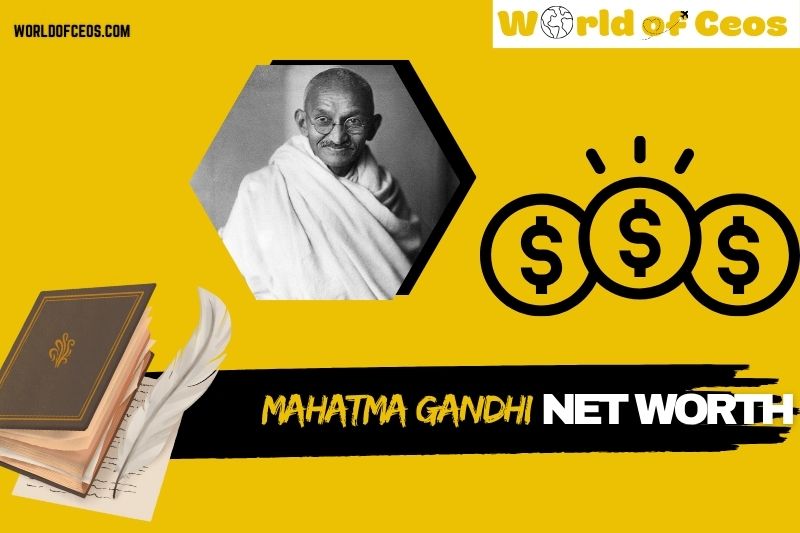Mahatma Gandhi, renowned for his leadership in the Indian independence movement, lived a life of simplicity and service. Despite his global influence, Gandhi’s financial legacy is far removed from material wealth.
This article delves into Mahatma Gandhi net worth, his earnings, and how his commitment to nonviolence shaped his unique approach to finances.
Quick Facts
| Fact | Detail |
|---|---|
| Real Name | Mohandas Karamchand Gandhi |
| Popular Name | Mahatma Gandhi |
| Gender | Male |
| Birth Date | October 2, 1869 |
| Age | 78 (January 30, 1948) |
| Parents | Karamchand Uttamchand Gandhi, Putlibai |
| Siblings | Laxmidas, Raliatbehn, Karsandas |
| Birthplace | Porbandar, Kathiawar Agency, British India |
| Nationality | Indian |
| Ethnicity | Gujarati Hindu Modh Bania |
| Education | Alfred High School, Inner Temple (London) |
| Marital Status | Married |
| Spouse | Kasturbai Gokuldas Kapadia |
| Children | Harilal Gandhi, Ramdas Gandhi, Devdas Gandhi, Manilal Gandhi |
| Dating | N/A |
| Net Worth | $1 |
| Source of Wealth | Activism, Legal Practice |
| Height | 5 ft 5 in (1.65 m) |
What Is the Net Worth of Mahatma Gandhi in 2024?

Mahatma Gandhi’s net worth is estimated at $1. This reflects his commitment to renouncing material possessions and living a life dedicated to service and simplicity.
Unlike modern-day influencers or business magnates, Gandhi’s legacy isn’t tied to wealth but to his ideals.
For comparison, here are other notable figures with varying net worths:
- Jawaharlal Nehru
- Martin Luther King Jr.
- Nelson Mandela
- Kasturba Gandhi
- Leo Tolstoy
- Rabindranath Tagore
- Subhas Chandra Bose
- Albert Einstein
- Winston Churchill
- Abraham Lincoln
If you’re curious about the wealthiest authors, explore our comprehensive guide.
Mahatma Gandhi Wealth, Salary, and Finance Overview

How Did He Shape His Role as a Leader?
Mahatma Gandhi’s journey began with his education in London, where he trained as a lawyer. His career took a pivotal turn in South Africa, where he experienced racial discrimination.
These events shaped his principles of nonviolent resistance or Satyagraha, laying the foundation for his leadership in India’s freedom struggle.
His approach was unique. Instead of leveraging financial power, Gandhi relied on moral authority and collective willpower. This strategy made his movements, such as the Salt March and Quit India Movement, globally recognized.
Key Campaigns and Movements That Defined His Success
Gandhi’s campaigns targeted the British Empire’s financial backbone. For instance, the Salt March undermined British salt taxes, symbolizing a direct challenge to colonial exploitation.
Similarly, the Quit India Movement rallied Indians to demand independence, uniting diverse communities against a common oppressor.
Through these efforts, Gandhi highlighted the power of nonviolence, demonstrating that even the most oppressive regimes could be challenged without violence.
Achievements That Cemented His Legacy
As the Father of the Nation, Gandhi achieved widespread recognition. His title of Mahatma, meaning “great soul,” was a testament to his influence.
His efforts not only led to India’s independence but also inspired global movements for civil rights, including leaders like Nelson Mandela and Martin Luther King Jr.
Lifestyle Choices and Their Influence on His Philosophy
Gandhi’s lifestyle was deeply symbolic. He adopted a dhoti, spun with a traditional wheel, as a statement against British industrial goods. His fasting was another powerful tool, representing both personal discipline and political protest.
Living in self-sufficient communities like Sabarmati Ashram, Gandhi embodied the values he preached. This simplicity inspired millions to rethink the value of material possessions.
Contributions to the Global Civil Rights Movement
Gandhi’s ideas extended far beyond India. His philosophy of nonviolence influenced global leaders and civil rights movements. For instance, his principles were central to the strategies employed by Martin Luther King Jr. in the U.S.
Internationally, Gandhi is remembered as a pioneer of peaceful resistance, with October 2 celebrated as the International Day of Nonviolence.
How His Personal Sacrifices Contributed to His Legacy
Gandhi’s life was marked by sacrifices. He endured multiple imprisonments, hunger strikes, and ultimately paid with his life for the ideals he championed.
Yet, these sacrifices solidified his image as a selfless leader devoted to the greater good.
FAQs About Mahatma Gandhi

Where was Gandhi born?
Gandhi was born in Porbandar, Kathiawar Agency, British India.
What was Gandhi’s educational background?
He attended Alfred High School in Rajkot and later studied law at the Inner Temple, London.
Who was Gandhi’s wife?
Gandhi was married to Kasturbai Gokuldas Kapadia in an arranged marriage.
How many children did Gandhi have?
He had four sons: Harilal, Manilal, Ramdas, and Devdas.
What movements did Gandhi lead in India?
He led key movements like the Salt March and the Quit India Movement.
What was Gandhi’s philosophy?
Gandhi championed nonviolent resistance, also known as Satyagraha.
When did Gandhi pass away?
He was assassinated on January 30, 1948.
Why is Gandhi called the “Father of the Nation”?
This title reflects his central role in India’s fight for independence.
How did Gandhi influence global leaders?
Leaders like Nelson Mandela and Martin Luther King Jr. drew inspiration from his philosophy of nonviolence.
Why did Gandhi adopt a simple lifestyle?
He believed simplicity allowed him to connect with India’s rural poor and reject materialism.
Conclusion
Mahatma Gandhi’s financial legacy may be modest, but his impact on the world remains immeasurable.
At WorldofCeos, we invite you to explore more about historical figures who shaped the world. Share your thoughts or explore more at worldofceos.com.

